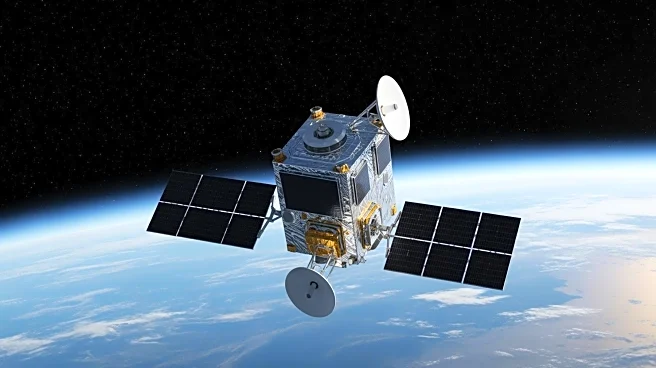What's Happening?
Airbus has successfully launched the second SpainSat NG-II satellite from the Kennedy Space Center, Cape Canaveral, on October 23, 2025. This satellite is part of a constellation developed by Airbus and Thales Alenia Space, aimed at providing secure communications
for the Spanish military and international organizations such as NATO. The satellite operates in geostationary orbit using X, military Ka, and UHF frequency bands, offering high throughput secure communications. It features an X-band active receive and transmit antenna system, equivalent to 16 traditional antennas, ensuring reliable communications for military and government missions. The satellite is also equipped with technology to eliminate and geolocate jamming attempts and is radiation hardened to protect against potential nuclear threats in space.
Why It's Important?
The launch of the SpainSat NG-II satellite marks a significant advancement in secure communications for military and government operations. By enhancing the capabilities of the Spanish Armed Forces and international partners like NATO, this development strengthens strategic autonomy in space. The satellite's ability to adapt coverage rapidly and resist jamming attempts is crucial in maintaining secure communications in potentially hostile environments. This launch also reflects Europe's commitment to bolstering its defense industrial strength and strategic autonomy in space, aligning with the European Union's objectives to increase intra-EU defense trade and enhance critical infrastructure related to telecommunications and national security.
What's Next?
Following the successful launch, Hisdesat, a Spanish government-owned satellite services company, will operate the satellite constellation on behalf of the Ministry of Defence. The satellite is expected to begin providing services to NATO and other international organizations by spring 2026. Additionally, Airbus, Leonardo, and Thales have agreed to form a joint venture to increase the competitiveness of the European space industry, potentially operational by 2027. This collaboration aims to pool resources to strengthen Europe's strategic autonomy in space, supporting critical infrastructure and services related to telecommunications, global navigation, earth observation, and national security.
Beyond the Headlines
The advancements in satellite technology, such as radiation hardening and jamming elimination, highlight the growing importance of space-based security measures in the face of potential threats. The collaboration between major European aerospace companies signifies a strategic move to consolidate resources and expertise, potentially leading to long-term shifts in the global space industry landscape. This development underscores the increasing role of space technology in national defense and international security, as well as the ethical considerations of militarizing space.

















